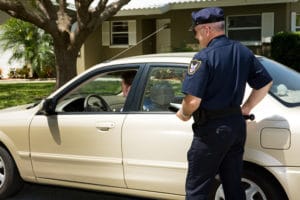You are not typically under arrest during a traffic stop.
Most Americans have a fairly muddled view of the criminal justice system as a result of our viewings of Law & Order and other police and legal dramas on television and the movies. We know a lot of things, but may not understand how they apply to different situations. And it’s no wonder — the law is confusing, and there are different exceptions and rules for almost every case.
Take for example, Miranda warnings. Most people can recite at least the first few lines from memory: “You have the right to remain silent. Anything you do say can and will be used against you in a court of law. You have the right to an attorney….”. But how many of us know when we are supposed to receive Miranda warnings, or what exactly they mean?
Under the Supreme Court’s landmark ruling in Miranda v. Arizona, police officers are required to give what have become known as “Miranda warnings” to suspects who are (1) in custody and (2) subject to interrogation. A suspect is in custody when he or she is not free to go, such as when he or she has been taken to the police station, or when he or she has been handcuffed. A person is being interrogated when he or she is being questioned, or when a law enforcement officer is making statements that are designed to get the person to respond.
As Los Angeles criminal defense attorneys, our clients often wonder why they haven’t been read their Miranda rights after they have been stopped by the police for a traffic violation. While a traffic stop can be considered an arrest in some circumstances, the Supreme Court has found that as a general rule, a typical roadside traffic stop does not put a driver “in custody” in the same way that an arrest does. For that reason, he or she is not entitled to receive the Miranda warning — and if the police fail to give the warning, his or her statements won’t be thrown out of court.
Of course, this situation could change rapidly. During this traffic stop, the police could spot an illegal gun or drugs in the car, at which point the person is placed under formal arrest. At that point, the police would be required to read the suspect his or her Miranda rights. If the law enforcement officers fail to do so, then a Los Angeles criminal defense attorney would have grounds to file a motion to suppress any resulting confession or statement.
Evidentiary issues like Miranda warnings can be complex, and require the assistance of a seasoned Los Angeles criminal defense attorney. At the Chambers Law Firm, we are experienced former prosecutors and police professionals. Contact us today at 714-760-4088 or dchambers@clfca.com to schedule a free initial consultation. We will fight for your rights and your freedom and stand by your side through each step of the process.





